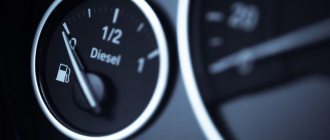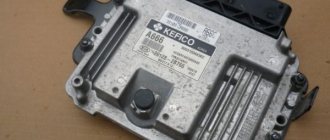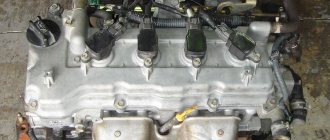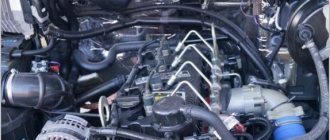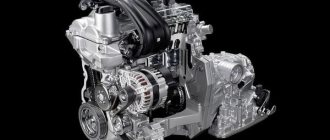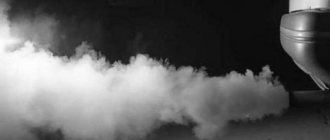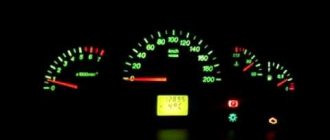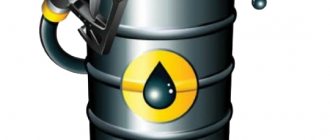Let's compare the operation of the motors
To better understand why the oil of one engine is not suitable for another, let’s figure out what characteristics they have that differ:
- A diesel engine has a higher degree of mixture compression (in some models it is almost twice the compression of a gasoline engine), which makes its pistons and cylinders more susceptible to overheating (according to scientific theory, a diesel engine is a “heat-stressed engine”).
- In addition, it has a lower revving speed; diesel engines whose revs reach 5000 per minute are rare. It is also important to note that the ignition of the mixture occurs from strong compression, not from a spark from the spark plugs; it often happens that the fuel (at least a little) does not burn out completely.
- A gasoline engine has a lower compression ratio and the temperature inside the cylinders is much lower. If we take into account turbocharged (equipped with an air turbine) engines, they are generally considered cold-blooded, because in winter it is very difficult to warm them up to high temperatures.
- In a gasoline engine, the revolutions are simply prohibitive for diesel engines; the engine can be accelerated to 9000 rpm, and if you slightly pump it up, you will get 10 - 12 thousand revolutions. Here the mixture is ignited by spark plugs, they provide the spark that ignites the fuel. Fuel combustion in the gasoline version is more complete.
This is interesting: Windshield wiper drive - how does this mechanism work?
Diesel oil in a gasoline engine - what are the consequences?
Until the era of electrification of cars finally arrives, the most common engines on the market are gasoline and diesel. If the owner maintains them properly, they can last a very long time.
However, every person encounters errors that can cause enormous harm to the power unit. In some cases, the mechanism can be saved, but sometimes it cannot be restored. For example, what could be the consequences if you fill a gasoline engine with diesel oil?
Such a moment can happen in the life of every car owner. Simple fatigue can lead to this - after a hard day at work, you stopped at a store to buy motor oil for your car and, out of fatigue and absent-mindedness, said something different to the seller. As a result, instead of oil for a gasoline engine, it gives you lubricant for a diesel engine, which you hastily fill in. What actions to take next?
Everyone knows that the operating principle of a diesel unit is fundamentally different from a gasoline unit. In addition to the fact that the fuel system itself differs, diesel has a higher compression ratio and operating temperature. When the engine reaches maximum torque, the speed is much higher than that of a gasoline engine. Another difference between heavy fuel engines is that there are no spark plugs, due to which the diesel does not burn, but turns into soot. All the negative consequences of the operation of a diesel unit are dealt with by oil, which not only lubricates, but also cleans it.
In simple words, diesel engines are more efficient, but they work at a more intense pace. That is why a special oil is intended for them, which can maintain their performance. The composition of diesel lubricant has a very complex formula. More powerful additives and additives are used here that can clean the engine of oxides. In addition, the oil has a high alkaline number - this is necessary to reduce oxidation. Now we return to the main question - what will happen to a gasoline engine if such oil is poured into it?
Let's take a car with a not-so-new engine. If the car is used in city conditions, travels short distances and is often stuck in traffic jams, then there is 100% carbon deposits inside it. If diesel oil is accidentally poured here, it will wash away these deposits. At speeds up to 4000, the diesel engine will begin to destroy carbon deposits, and when washing the engine it will be very easy to remove them. It would seem - what a good plus. However, if the piston system is very dirty, the deposits may wash out in large chunks that clog the oil passages. The end result will be oil starvation and engine failure.
Let's consider the option when a modern engine is installed in the car. When diesel oil starts to heat up, carbon deposits will form in the engine. And this happens due to the ash content of the oil. The resin will begin to clog the channels, which will again lead to oil starvation. Both cases have serious consequences. Therefore, it is best to come to the store cheerful and full of energy and not be distracted by other things.
Bottom line . Diesel oil can severely damage a gasoline engine. To prevent this from happening, you need to be careful when purchasing and always read the label so you know what you are putting into your car.
Why are gasoline cars sometimes filled with diesel?
Have you ever accidentally poured diesel into your gasoline car? Probably not yet. But... it's possible. And you need to know what consequences such a mistake entails.
To be fair, it must be said that such situations occur infrequently. If only because at most Russian gas stations the tip of the diesel gun does not fit into the neck of the gasoline tank. This is true for 95–98% of cars.
For comparison: the diameter of the “barrel” of a gasoline pistol is 21 mm, and that of a diesel pistol is 25 mm. However, we should not forget about the existence of all kinds of adapters, as well as the mystery of the Russian soul. In addition, not all gasoline models have such a narrow neck.
In general, there are many reasons why diesel was suddenly poured into the car instead of gasoline. You might just think about it and put the wrong gun in the tank while parked and even tell the operator the wrong pump. Or you are used to driving your diesel Toyota and therefore automatically filled your wife’s petrol Logan with the same fuel. In the end, the mistake could have been made by a young gas station attendant who was so eager to get a tip from you that in his haste he mixed up the pistols.
The question is not why this happened, but what to do next.
Is it possible or not?
Based on comparisons, I can say unequivocally that oil for a gasoline engine will kill a diesel engine and very quickly. Since all its parameters are many times lower than required.
In a situation where we pour diesel into a gasoline engine, it seems that nothing bad can happen, and there is an opinion of “traditional craftsmen” that this is not dangerous, but it only seems:
- Diesel oil is designed for high temperatures and pressure; it will make it difficult to start and warm up a gasoline engine.
- It is not designed for high speeds, which means the motor will wear out quickly.
- Diesel oil cleaning agents clog the oil passages of gasoline engines.
- Inconsistency between additives and application conditions will quickly spoil the oil itself.
- Almost everyone forgets about the filter, and the oil filter of a gasoline engine is not designed for diesel oil; it can quickly become clogged, reduce the pumping speed and cause oil starvation. And everyone knows what this threatens the engine with.
The use of diesel oil in gasoline is justified only as a flushing oil, since it contains many cleaning components. When flushing, it is used for a short time, and at idle speed, such use is permissible, and the benefit is significant and there is no harm.
Only the question of expediency arises, flushing the engine will cost less, and buying lubricant to pour out after a couple of hours is kind of funny, isn’t it? Because, after being used as a rinse, it can no longer be used for its intended purpose.
If you don't believe me, experiment on your car at your own risk.
What to prepare for after “treating” a gasoline engine with diesel fuel?
Again, everything will depend on the will of His Majesty the case. If you're lucky, the car service center will flush out the fuel system to remove any residual incorrect fuel. Be sure to replace fuel filters , since an oily coating will remain on them, and paraffins, which are rich in diesel fuel, will clog the mesh and membranes of the cleaning device. It will not do without cleaning or carburetor injectors and replacing the spark plugs . Plus, you will have to drain all the fuel from the gas tank and wash it. That's if you're lucky.
If not, the mechanics will take over. If the engine is experiencing moderate damage, the engine will need an oil change , which may have diesel leaking through the cylinders and from the oil filter .
Well, if you ignore the shocks and uneven operation of the machine, the power unit , including a major overhaul.
That's it. Straight tales from the Arabian Nights...
What to do if gasoline is poured instead of diesel fuel
- Stop refueling immediately: If you fill up with gasoline, some experts say there's a good chance nothing will happen to the car—as long as your diesel contains no more than 5 percent gasoline. If you really want to take the risk, continue to refuel frequently to top up your diesel fuel and thereby reduce the percentage of gasoline in your tank as quickly as possible.
- Inform the gas station attendant. Staff will be able to help you push your vehicle to the correct gas station. Be sure to turn the ignition key to unlock the steering. Do not turn on the dashboard lights or start the engine!
- Call technical support or a fuel specialist: the gas station will likely have contact details for a suitable company if your technical support cannot help.
- Wait for service with the car (assuming it's parked safely): a car's tank can usually be drained and flushed on site in about 30-40 minutes. You can then refill with suitable fuel
Why you can’t put diesel in a gasoline car
But because the principles of ignition and combustion of fuel in diesel and gasoline engines are completely different. And each mechanism is tailored to its own principle.
Gasoline fuel ignites instantly and burns quickly. And for more complete combustion, it is ignited by an ignition spark under high pressure. And the higher the compression ratio gasoline can withstand, the higher its grade.
Diesel is produced in such a way that it self-ignites under strong compression and burns slowly, ensuring smooth piston stroke. For smoother combustion, a sub-injection is first made, and after a while the main part of the fuel is injected. There is no forced ignition in the system. And the shorter the time interval between the injection of diesel fuel and its self-ignition, the better.
As you can see, diesel does not at all meet the requirements for the fuel that can be used in a gasoline engine.
In addition, these types of fuel differ in structure. Gasoline is light and “dry”, diesel is heavier and oilier. Gasoline is used in tandem with motor oil, and diesel fuel in itself is an excellent lubricant.
This is interesting: Polishing headlights - making the light on the road brighter
What happens if you add diesel fuel to gasoline, and vice versa?
Inattention, a gas station driver's mistake, or a desire to experiment. At least once in his life, a car enthusiast has poured “non-native” fuel into the gas tank, mixed gasoline with diesel fuel, or asked the question: “Is it possible?” Let's figure it out.
About engine operation
Before answering the question, it is important to understand the difference in operation of gasoline and diesel engines.
In a gasoline engine, fuel is first injected into the cylinder and compressed under pressure. Then ignition occurs with an electric spark from a candle. When ignited, the flammable mixture pushes the piston and it moves. If there is no ignition from a spark, the engine will not start. Diesel fuel does not have such properties.
In a diesel engine, fuel is supplied separately from the air mixture, which is highly compressed. Fuel enters the cylinders due to pressure at the very end of air compression. At the next stage, the fuel is split into tiny particles and sprayed into the chamber, spontaneously igniting from compressed air. In this case, the largest volume is burned even before the piston reaches the so-called top dead center. If the fuel mixture starts to ignite earlier, it will disrupt engine operation.
It is important to take into account the completely different characteristics of fuels. The octane number of gasoline indicates the ability of gasoline to spontaneously ignite, and the cetane number of diesel fuel indicates its ability to ignite during its compression. By mixing the two species, mutually exclusive quantities can interact.
Gasoline in diesel
You can often hear how motorists dilute diesel fuel with gasoline to improve the flammability of the mixture and make it more fluid. This is especially true in Russian frosts. But is it safe for the engine?
If the car is old, then serious negative consequences can be avoided. But in modern diesel engines, which operate at high pressure and within precise tolerances, problems can occur.
Gasoline will dramatically reduce the lubrication characteristics of diesel fuel, which will increase wear on the vehicle’s fuel system. In addition, gasoline burns at a higher temperature than diesel. Therefore, it will increase in the combustion chambers, and the power of the power unit will decrease. What will the driver do? Give it gas. As a result: overheating, problems with mechanics and, probably, replacement of valves, pistons, heads, gaskets. This is the best case scenario.
At worst, the engine will have to be overhauled or replaced. Because the gasoline will spontaneously ignite prematurely and force the pistons to work. Combustion will begin before top dead center, and the force acting on the piston will not be synchronous with its position.
Speaking of frost. Yes, it is possible to dilute diesel fuel with gasoline, but strictly no more than 25% of the volume of diesel fuel. And only in an emergency, when there is no other way to start the car. But it’s better to be prepared for such situations in advance and add a depressant-dispersant additive to the diesel engine. It will reduce the maximum filterability temperature and pour point. The engine will start even in severe frosts.
Diesel in gasoline
If diesel gets into gasoline, the fuel will separate into fractions. The density of diesel fuel is higher, so it falls down to the neck of the line and enters the engine, while gasoline rises up. Engine malfunctions occur as soon as the fuel mixture, where diesel predominates, is injected into the combustion chambers. Heavy fuel does not react well to a spark. And the compression ratio in gasoline engines is one and a half times less than in diesel engines. As a result, the fuel does not explode, the engine stalls, and carbon deposits form on the spark plugs. To fix the problem, you will have to completely drain the fuel from the tank and refill it with gasoline. Clean or replace the spark plugs and crank the engine to remove any remaining diesel fuel. Something catastrophically terrible will not happen to the car, but you will spend enough time. Our advice: it’s better not to experiment. And even in a critical situation, avoid mixing diesel fuel and gasoline. Save time, money and nerves.
Common Myths
Myth 1: Lots of diesel fuel + lots of gasoline = safety
There is an opinion circulating on the Internet that if you have the brains, you can create some kind of safe mixture of gasoline and diesel in the tank, and this mixture will be practically safe for the engine. But:
- Firstly, even a small amount of diesel fuel in a gasoline engine will lead to carbon deposits and clogging of the injection nozzles.
- Secondly, whatever one may say, diesel fuel is heavier than gasoline, so in the tank it will tend to sink to the bottom in order to be used first.
Of course, there will be no sharp separation of fractions, because while the car is moving, the fuel splashes in the tank and is partially mixed. But the bulk of the solarium will still settle below.
Myth 2: If there is gasoline left in the tank, the car will first “finish” it
Again incorrect and for the same reason: the remaining gasoline is lighter than diesel fuel, so it will tend to rise. The engine will only be able to operate on its native fuel for the first few strokes, while the gasoline previously pumped into it is stored in the pump and lines.
Filled with diesel instead of gasoline. What to do?
It is quite difficult to pour diesel fuel instead of gasoline into a car tank, since the nozzle for diesel fuel is larger in diameter than the nozzle for gasoline . But this is provided that everything at the gas station is in accordance with GOST. If the nozzles were mixed up at a gas station, or the driver refueled directly from a fuel tanker, or asked someone to drain some fuel, then the consequences of such an oversight can be very disastrous for the engine and fuel system.
The situations may be the following:
- a full tank of unsuitable fuel is filled;
- We added diesel to the gasoline up to the top.
In the first case, the car may not start at all, or drive a short distance on the gasoline that remains in the fuel system. In the second case, diesel will be mixed with gasoline and the engine and fuel will burn incorrectly, as you can tell by failures in engine operation and black smoke from the exhaust pipe.
As you know, gasoline and diesel are produced from oil by distillation; gasoline is obtained from lighter fractions, diesel from heavier fractions. The difference in the operation of diesel and gasoline engines is obvious:
- diesel - the fuel-air mixture ignites under high pressure without a spark;
- gasoline - the mixture ignites from a spark.
Hence the conclusion - gasoline engines do not create normal conditions for ignition of diesel fuel - there is not enough pressure. If you have a carburetor, then diesel fuel will still enter the cylinders, but will not ignite. If there is an injector, then the injectors will simply clog after a while.
If diesel is mixed with gasoline, then only gasoline will ignite, while diesel will clog everything possible and will leak into the crankcase, where it will mix with engine oil. In addition, there is a very high probability of valves sticking, and what can this lead to - the pistons will start knocking on the valves, bend them, break themselves, in the best case, the engine will simply jam.
It is very difficult to imagine how much such repairs will cost.
But even if there are no such dire consequences, you will still have to give your all to:
- replacing fuel and oil filters;
- complete cleaning of the tank and fuel lines;
- replacing piston rings - diesel fuel produces a lot of soot and soot;
- washing or purging injector nozzles;
- complete oil change;
- installation of new spark plugs.
Diesel fuel has completely different characteristics, and by its appearance it is very easy to distinguish it from gasoline: gasoline is a transparent liquid, while diesel fuel has a yellowish tint. In addition, diesel contains paraffins.
What to do if you are faced with such a situation?
The sooner you notice the problem, the better. It will be worse if the car drives a few kilometers and stalls right in the middle of the road. There will be only one way out - call a tow truck and go for diagnostics . If you filled in just a little diesel - no more than 10 percent, then the engine, although with difficulty, will be able to continue working. True, then you will still have to completely flush the fuel system, injector nozzles, and replace filters.
We can only advise one thing - refuel at trusted gas stations, do not buy fuel on the side of the road, and be careful which hose you insert into the tank.
( 1 ratings, average: 5.00 out of 5)
Opinion of “experts”
"In my humble opinion…"
You can find some “experts” on the forums who seriously claim that diesel fuel not only does not harm a gasoline engine, but is even beneficial if mixed with gasoline. This is argued by the fact that fuel consumption will be lower. If in the case of acetone the engine at least does not die, then with diesel fuel the opposite is true. Some newbies believe this myth.
More knowledgeable people claim that the engine will simply stall and not start, others suggest that in theory the car will be able to drive under its own power, but the longer the engine runs on diesel fuel (DF), the more fatal the consequences will be for it. At the same time, a clogged fuel system is not the worst thing; the need for a major engine overhaul is much worse. Some will even assume that nothing bad will happen.
About the consequences
If you manage to turn off the engine in time and take a tow truck to a car service center, you can get off more or less lightly. The tank and entire fuel system will be flushed, fuel filters and spark plugs will be replaced, and injectors will be cleaned. This is a successful scenario for the development of the situation.
In the worst case, the engine will need to be overhauled. In most cases, compression decreases, which indicates that the rings are either stuck due to coking or broken. You can try to correct the situation by pouring decoking. Otherwise, you will need to disassemble the engine, clean, rinse and replace damaged parts.
Video: what to do if diesel fuel is poured into a gasoline engine?
A mistake at the gas station is not a death sentence, and in most cases, costly repairs can be avoided. The main thing is to be able to listen to your car and understand its operation.
Fuel “switching” was discovered en route
It’s much worse if after refueling you didn’t notice anything special at first. This happens if there is not much diesel fuel and its ratio to gasoline is 1:2 or more in favor of light fuel. The engine will gradually lose power, twitch, and smoke. But you have already driven some distance from the gas station. In almost any situation, except for the one where people’s lives depend on the vehicle moving a few hundred meters further, the engine should be stopped immediately, returned to the refueling station in a tug or tow truck and demand an examination of the fuel poured into the tank. In this case, it is better to save receipts - at least from the last refueling.

